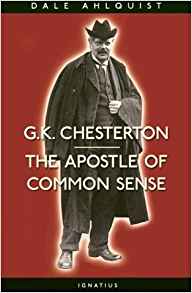I just finished a book entitled G. K. Chesterton: The Apostle of Common Sense, by Dale Ahlquist. I thought I would share a few thoughts on this fascinating writer with you today.
Gilbert Keith Chesterton (1874-1936) was a British writer, poet, philosopher, dramatist, art critic, and lay theologian. During his life, he produced 80 books, 200 short stories, 4,000 essays, and several plays. His most famous fictional character is the priest-detective Father Brown. His most prominent apologetic work is Orthodoxy.
 G. K. Chesterton (as he was called) was a large man: 6’ 4” and close to 300 pounds. He could make fun of his girth. During World War I, a woman asked him why he wasn’t “out at the front.” He replied, “If you go round to the side, you will see that I am.” He also claimed to be one of the most polite men in the country. After all, he said, on a bus he could stand up and give his seat to three ladies.
G. K. Chesterton (as he was called) was a large man: 6’ 4” and close to 300 pounds. He could make fun of his girth. During World War I, a woman asked him why he wasn’t “out at the front.” He replied, “If you go round to the side, you will see that I am.” He also claimed to be one of the most polite men in the country. After all, he said, on a bus he could stand up and give his seat to three ladies.
Chesterton often was draped in a cape and used a walking stick. He wore a crumpled hat and was frequently photographed with a cigar.
At birth, Chesterton was baptized in the Anglican Church, but as a youth he said he was an agnostic. In 1901 he married Frances Blogg who brought him back to the Anglican Church. The couple deeply desired to have children but, despite the medical help of their day, they were unable to conceive. Later, however, they adopted a daughter. Throughout his career, Frances was Gilbert’s literary assistant and manager. In 1922 Chesterton shocked many of his friends by becoming a Roman Catholic. Four years later, his wife followed him into the Catholic Church.
Chesterton not only loved to write, he also loved to debate publicly. George Bernard Shaw was one of his favorite “sparring partners.” Although the two men disagreed on practically everything, they somehow remained close friends. Chesterton also debated with H. G. Wells and Bertrand Russell. One of his closest friends was the writer Hilaire Belloc.
Chesterton made use of not only the printed word, but radio as well. From 1932 until his death he gave 40 radio talks a year, talks that were extremely popular. Chesterton’s writing and speaking are characterized by wit and humor even while discussing serious topics such as government, history, economics, politics, philosophy, art, and theology. He also frequently employed paradox to make a point. For example, he said, “Anything worth doing is worth doing badly.” In other words, don’t let perfectionism get in

the way of doing good.
Despite all his virtues, Chesterton had his faults. He has been criticized for being anti-Semitic in some of his writings. He could also be bombastic. But interestingly, the April 2015 issue of The Atlantic ran an article making the case for Chesterton’s canonization.
It seems fitting to conclude this brief description of Chesterton with a few of his memorable quotes. He has so many good ones, I had a hard time selecting these twelve:
1) An inconvenience is only an adventure wrongly considered; an adventure is an inconvenience rightly considered.
2) It is the test of a good religion whether you can joke about it.
3) Fallacies do not cease to be fallacies because they have become fashions.
4) To be clever enough to get all the money, one must be stupid enough to want it.
5) Love means loving the unlovable—or it is no virtue at all.
6) To have a right to do a thing is not at all the same as to be right in doing it.
7) Tradition means giving votes to the most obscure of all classes, our ancestors. It is the democracy of the dead.
8) All slang is metaphor, and all metaphor is poetry.
9) One can sometimes do good by being the right person in the wrong place.
10) The supreme adventure is being born.
11) The test of all happiness is gratitude.
12) The Christian ideal has not been tried and found wanting; it has been found difficult, and left untried.
Does anything in this reflection stand out for you?
Do any of Chesterton’s quotes touch you? Which one(s) and why?
Do you know any other Chesterton quotes that you would like to share with us today?
In honor of Chesterton’s heritage, I chose a 17th Century Anglican Hymn sung at a 2013 service at Westminster Abbey. As you will see, the royal family is in attendance. Some might find the song “old fashioned” or be annoyed by the gender exclusive language, but I still see beauty in these ancient hymns. The lyrics are not given on the video, but here are the first and final verses:
Praise to the Lord, the Almighty, the king of creation!
O my soul, praise him, for he is your health and salvation!
Come all who hear: now to his altar draw near,
Joining in glad adoration.
Praise to the Lord, O let all that is in us adore him!
All that has life and breath come now with praises before him.
Let the “Amen” sound from his people again,
Now as we worship before him.
Do you have a response you’d like to share below?






20 Responses
Of the 12 quotations, I was familiar with #3 and #5, but I especially like #8 and #11!
That’s a snazzy signature he had!
Oh yes, I know what it’s like to be able to give up more than one seat on public transportation! (I’m maybe a seat-and-a-half wide!)
Quite moving to hear that he was friends with his opposite number in debates, George Bernard Shaw. In an age (ours) that seems to thrive on magnifying differences and heaping disdain on those with whom we disagree, there’s something marvellously refreshing (and implicitly instructive!) about the Chesterton/Shaw friendship.
What a lovely reflection Sr. Melannie! GK Chesterton seems to encourage us to take risks and see what happens.
I like that he stayed friends with folks he disagreed with so passionately.
Kathkeen
So refreshing, enlightening; simply majestic. Praise to the Lord and thanks to you.
Good Morning, Melannie!
Chesterton is one of those writers I’ve heard about my whole life but have never read, but after reading your blog, he’s going on my “to read” list.
Wait a minute, The Atlantic ran an article in favor of his Canonization?!
Of these twelve Chesterton quotes, two most vividly stood out before me this morning. They are # 5 and # 6.
5) Love means loving the unlovable—or it is no virtue at all.
This speaks for itself. Pope Francis is our best example. He is so humble in his relationship with the poor, the sick and the under privileged. Pope Francis said “True power is service. The pope must serve all people, especially the poor, the weak, the vulnerable.” He follows up with many examples such as kissing the man disfigured by multiple tumours, washing the feet of young prisoners, placing showers in the Vatican for the homeless etc.
6) To have a right to do a thing is not at all the same as to be right in doing it.
It comes to mind the many rights our governments have passed into law which are contrary to God’s law. In many countries the slippery slope against Christian values and ethics continues. It is “legal” to take away human life before it begins and also “legal” to end human life before its natural completion. Although according to man made laws we have a right to abortion and doctor assisted suicide, it will never be right to do so because it contradicts natural law which is the will of God.
Thanks for the reminder that, lest we be prayerfully vigilant in our society, it could be easy to deny Christ as did Peter or even betray him as did Judas.
Happy Monday, Dear Melanie,
I enjoyed this article so very much! It is the one year anniversary of my husband’s death, so the day will be a bittersweet one.
I relate to number five; loving friends is easy, finding love for difficult people is a tough act, but those are the ones who need Love the most!
Today that shall be my quest…
Love you, and make a great day
Rosemary
Dear Rosemary, My prayers are with you on this anniversary of your husband’s death… I know those anniversaries can be hard… Sr. Melannie
A most recent Catholic School opened nearby and is called “Chesterton Academy” and now it means even more to me. He is truly a great and holy man.
Having a son with paranoia & severe depression means it’s difficult to love him ; I do love him, but I can’t stand him! So we have a restraining order for 3 years until August, 2019. His birth was\is the supreme adventure! Thanks for letting me vent this cross of gratitude.
My prayers are with you, Joe. God bless you.
Dear Joe, What a major cross you are bearing… I support you with my prayers… Sr. Melannie
I usually sing the first verse as I pad down the hall for my first cup of coffee. It seems such an appropriate way to start the day.
#5 stands out (Love means loving the unlovable – or its no virtue at all)
because it’s so easy to grasp and so hard to do. I will practice this…practice…practice…practice. Thanks for the reminder.
Also love the song! Have a blessed day!
Thank you, Sister.
I too was struck by the relationship between Chesterton and Shaw. How wonderful it is when two people have that wonderful combination of deep convictions and full measures of self esteem, so that they have nothing to fear about the other’s opposing views.
Never heard of this man until you enlightened me sister. He’s amazing! Inspiring! Love the quotes. Thanks a bunch! Nita
Thank you, Sister Melanie
The hymn is one of my favorite from my youth. I still sing it today from memory often when I’m in nature walking my dog , giving thanks for God’s creation. As for the quotes I am especially fond of #7. It’s often forgotten how those who came before us not only set examples on how to live a just life but to also remember with respect & humility the sacrifices that have shaped our present. We must also realize that we will be the ancestors of the future….will our words & actions be ones we will be proud of and give hope & guidance to tomorrow’s generations?
Firstly, I’m not sure what is gender exclusive in that hymn…is it because a God is referred to as masculine?
Secondly, the spectacular beauty of the service in Westminster Abbey is heartbreaking when we realize that we are rapidly losing these traditions.
Thank you Sister…Chesterton is a favourite of my husband’s.
What a joy to begin today with all this interesting information about Chesterson and this much-loved hymn. Thank you for faithfully sharing your thoughts and writing. #11 is the quote I choose to reflect on.